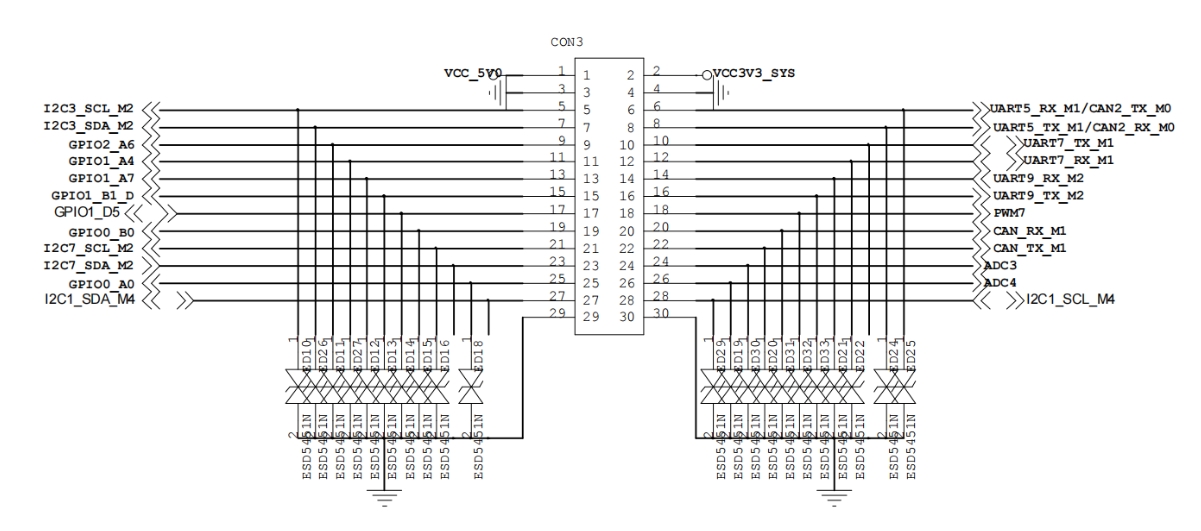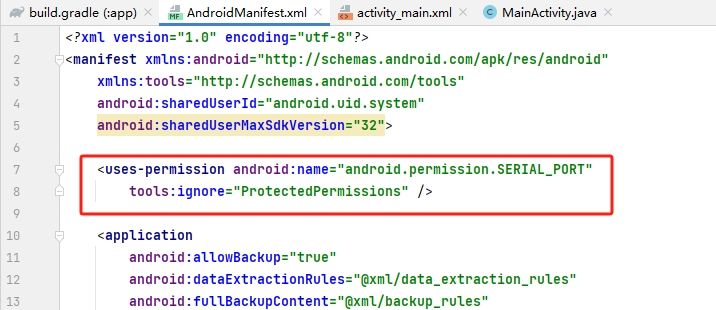¶ Preface
Rockchip UART (Universal Asynchronous Receiver/Transmitter) is based on the 16550A serial port standard. The complete module supports the following
Function:
- Supports 5, 6, 7, and 8 bits data bits.
- Supports 1, 1.5, and 2 bits stop bits.
- Supports odd and even parity, but does not support mark and space parity.
- Supports receive FIFO and send FIFO, generally 32 bytes or 64 bytes.
- Supports up to 4M baud rate. Actual support of the baud rate requires the cooperation of the chip clock frequency division strategy.
- Supports interrupt transfer mode and DMA transfer mode.
- Support hardware automatic flow control, RTS+CTS.
Rockchip UART ensures stability for commonly used baud rates, such as 115200, 460800, 921600, 1500000, 3000000, 4000000, etc.
support. For some special baud rates (we do not provide support for special baud rates), it may be necessary to modify the working clock frequency division strategy to support it.
¶ Uart pin
Hot Wheels Technology has developed a rk3588s motherboard, youyeetoo R1, which provides 40pin expansion pins, including 3-way uart pins. The pin distribution is shown in the figure below:

The pins are
- UART5_RX_M1 and UART5_TX_M1
- UART7_RX_M1 and UART7_TX_M1
- UART9_RX_M2 and UART9_TX_M2
¶ Hardware connection
Here the author takes the UART5 pin as an example. Connect the RX pin of UART5 to the TX pin of the serial port module, and connect the TX pin of UART5 to the RX pin of the serial port module. Then connect the GND of the board to the GND pin of the serial port module.
¶ Android Uart call
The permission management of the Android system is very strict. Using c++ or java to operate files or resources in the Android root file system requires corresponding permissions. The program written here is written based on the system app as a template. For system app, please refer to the chapter Creating system app. To use the official serial port API of the Android source code, in addition to being a system app, you also need to apply for serial port permissions. The application method is as follows:
- Add the following statement in AndroidManifest.xml:
<uses-permission android:name="android.permission.SERIAL_PORT"
tools:ignore="ProtectedPermissions" />

- Write uart function code in MainActivity.java
package com.youyeetoo.demo;
import androidx.appcompat.app.AppCompatActivity;
import android.annotation.SuppressLint;
import android.os.Bundle;
import android.hardware.SerialManager;
import android.hardware.SerialPort;
import android.os.Handler;
import android.os.Message;
import android.util.Log;
import android.view.KeyEvent;
import android.widget.EditText;
import android.widget.TextView;
import java.io.IOException;
import java.nio.ByteBuffer;
public class MainActivity extends AppCompatActivity implements Runnable, TextView.OnEditorActionListener {
private static final String TAG = "SerialChat";
private TextView mLog;
private EditText mEditText;
private ByteBuffer mInputBuffer;
private ByteBuffer mOutputBuffer;
private SerialManager mSerialManager;
private SerialPort mSerialPort;
private boolean mPermissionRequestPending;
private static final int MESSAGE_LOG = 1;
@SuppressLint({"WrongConstant", "MissingInflatedId"})
@Override
protected void onCreate(Bundle savedInstanceState) {
super.onCreate(savedInstanceState);
setContentView(R.layout.activity_main);
mSerialManager = (SerialManager)getSystemService("serial");
mLog = (TextView)findViewById(R.id.log);
mEditText = (EditText)findViewById(R.id.message);
mEditText.setOnEditorActionListener(this);
if (false) {
mInputBuffer = ByteBuffer.allocateDirect(1024);
mOutputBuffer = ByteBuffer.allocateDirect(1024);
} else {
mInputBuffer = ByteBuffer.allocate(1024);
mOutputBuffer = ByteBuffer.allocate(1024);
}
}
@Override
public void onResume() {
super.onResume();
String[] ports = mSerialManager.getSerialPorts();
if (ports != null && ports.length > 0) {
try {
mSerialPort = mSerialManager.openSerialPort(ports[0], 115200);
if (mSerialPort != null) {
new Thread(this).start();
}
} catch (IOException e) {
}
}
}
@Override
public void onPause() {
super.onPause();
}
@Override
public void onDestroy() {
if (mSerialPort != null) {
try {
mSerialPort.close();
} catch (IOException e) {
}
mSerialPort = null;
}
super.onDestroy();
}
@Override
public boolean onEditorAction(TextView v, int actionId, KeyEvent event) {
if (/* actionId == EditorInfo.IME_ACTION_DONE && */ mSerialPort != null) {
try {
String text = v.getText().toString();
Log.d(TAG, "write: " + text);
byte[] bytes = text.getBytes();
mOutputBuffer.clear();
mOutputBuffer.put(bytes);
mSerialPort.write(mOutputBuffer, bytes.length);
} catch (IOException e) {
Log.e(TAG, "write failed", e);
}
v.setText("");
return true;
}
Log.d(TAG, "onEditorAction " + actionId + " event: " + event);
return false;
}
@Override
public void run() {
Log.d(TAG, "run");
int ret = 0;
byte[] buffer = new byte[1024];
while (ret >= 0) {
try {
Log.d(TAG, "calling read");
mInputBuffer.clear();
ret = mSerialPort.read(mInputBuffer);
Log.d(TAG, "read returned " + ret);
mInputBuffer.get(buffer, 0, ret);
} catch (IOException e) {
Log.e(TAG, "read failed", e);
break;
}
if (ret > 0) {
Message m = Message.obtain(mHandler, MESSAGE_LOG);
String text = new String(buffer, 0, ret);
Log.d(TAG, "chat: " + text);
m.obj = text;
mHandler.sendMessage(m);
}
}
Log.d(TAG, "thread out");
}
Handler mHandler = new Handler() {
@Override
public void handleMessage(Message msg) {
switch (msg.what) {
case MESSAGE_LOG:
mLog.setText(mLog.getText() + (String)msg.obj);
break;
}
}
};
}
- Write the page in activity_main.xml
<LinearLayout xmlns:android="http://schemas.android.com/apk/res/android"
android:layout_width="match_parent"
android:layout_height="match_parent"
android:orientation="vertical"
>
<ScrollView android:id="@+id/scroll"
android:layout_width="match_parent"
android:layout_height="0px"
android:layout_weight="1"
>
<TextView android:id="@+id/log"
android:layout_width="match_parent"
android:layout_height="wrap_content"
android:layout_marginTop="25dp"
android:textSize="12sp"
android:textColor="#000000"
/>
</ScrollView>
<EditText android:id="@+id/message"
android:layout_width="match_parent"
android:layout_height="wrap_content"
android:singleLine="true" />
</LinearLayout>